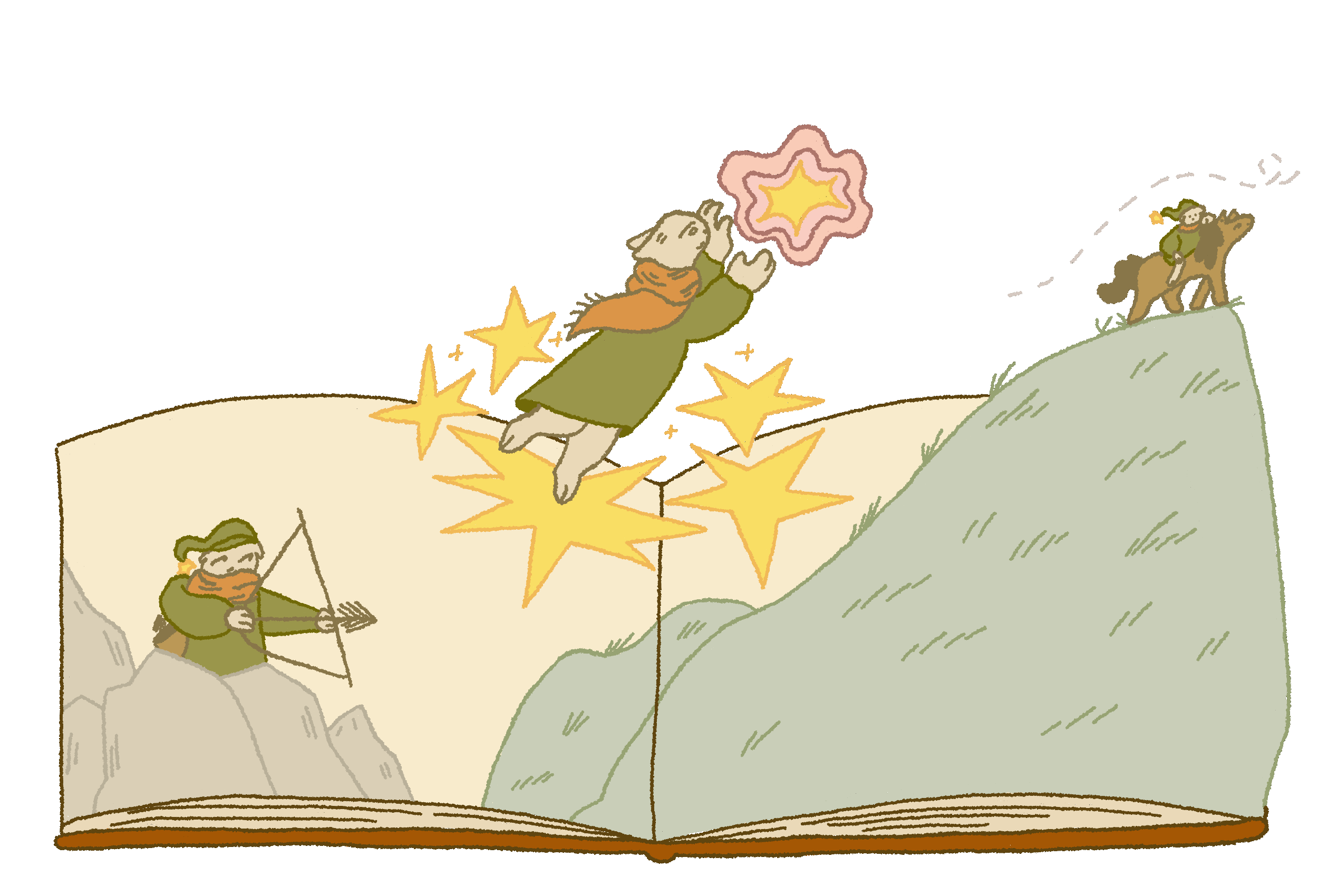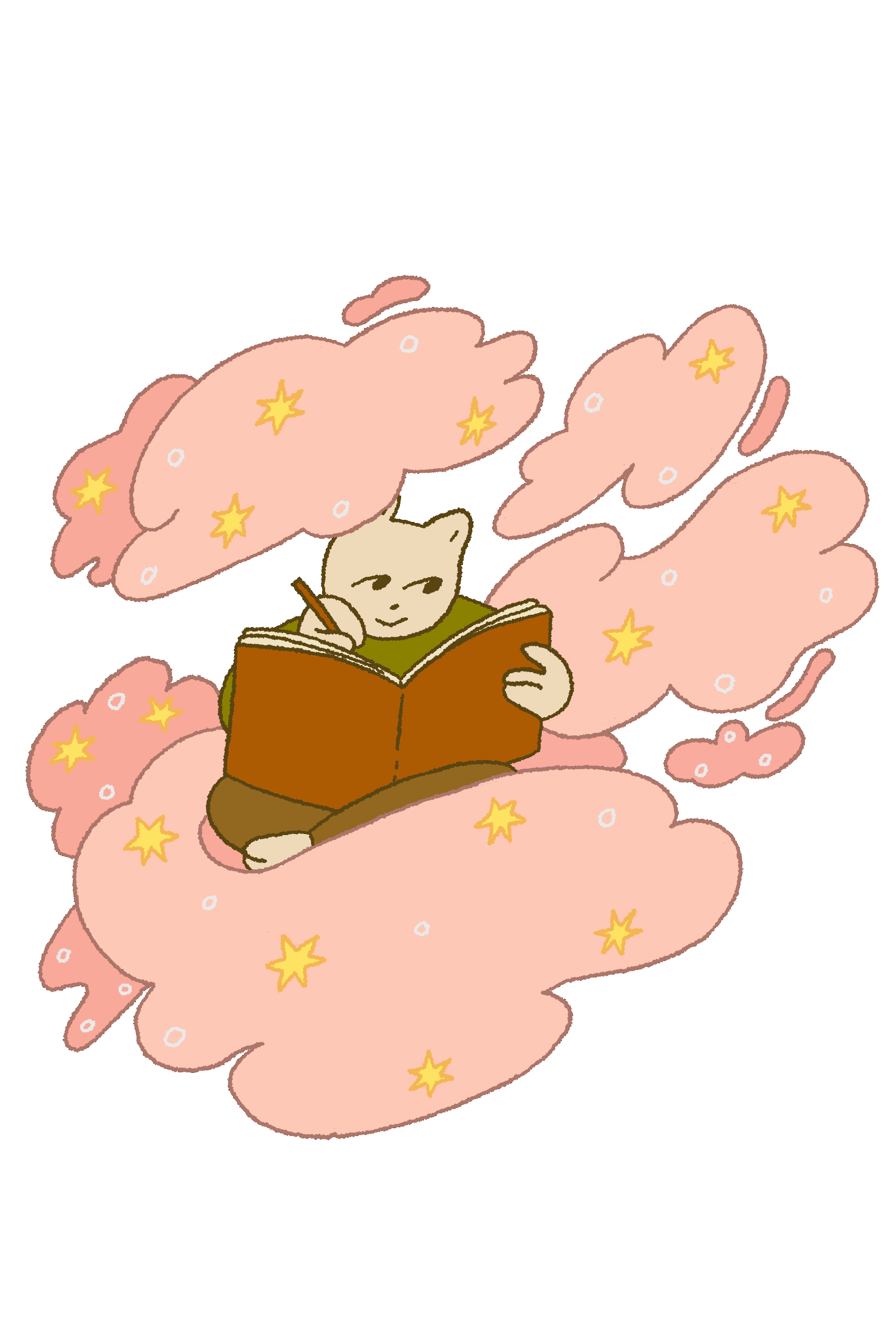Rediscovering imagination with journal role-playing games
When I read Nala's memoir in full, the breadth of her accomplishments was striking.
She soothed a grieving marsh nymph so it would stop poisoning a village's water with its tears. She offended a mendicant kachi warrior on their first meeting and was forced to duel. She lost. Still, honor was satisfied, and they became fast friends. She won an auspicious prize in a test of archery: a lock of hair from the fifth daughter of a fifth daughter. This later became a worthy offering for the titanic salamander Arum-Gar, who allowed Nala to cross the Amber Gorge over his spined tail.
Her adventure ended when she came upon a caravan of refugees – they nursed the wounded heroine despite not having enough for themselves. After regaining her strength, she planted her spear into the soil and vowed to make her fate the same as theirs. She found home.
This wasn't a fantasy novel about an archetypal hero's journey. It was a story I played in Her Odyssey, a solo role-playing game. I developed Nala's story in waiting rooms, my bed, and during flights. Fantastical scenes bloomed in my mind while I was surrounded by the mundanity of life.
The die is cast
Before I tried them for myself, I characterized role-playing games (RPGs) as an escapist hobby for socially awkward people. The fact that I matched this unflattering characterization was lost on me. An ex-girlfriend had to sit me down and frame it in a way that made sense: RPGs are like the fanciful adventures I played in as a child. When we do it in adulthood, there are just more rules and we're better at conflict management.
The stories we tell ourselves shape our perception of ourselves and the world around us. Could I rewrite bits of my own story through imaginative play?
Being one of the millions of young adults who'd given up my childlike wonderment for formal education, this appealed to me. There's something about growing up that saps our zest for imaginative play. Creativity takes a backseat to the functional and 'important' details of daily life. If we're not properly exposed to the arts, some of us start to fall out of practice with our own creativity.
Registered Clinical Counsellor Nilou Esmaeilpour believes that "imaginary play can be linked to the emergence of creative and problem-solving skills that raise cognitive functioning and overall mental resilience." That's the rationale driving the use of RPGs in therapeutic interventions to teach communication and problem-solving skills. There's also space for RPGs as a complementary therapy.
Resistance to the ever-present threat of mundanity is why Dungeons and Dragons became really cool this decade. An activity that was once the butt of tasteless jokes has snowballed into something that welcomes people from all walks of life. Role-playing games got another push when the COVID-19 pandemic nudged millions of people to more indoorsy pastimes. The refreshed image of RPGs is one where a group of friends are at a table and entertaining each other. They're socializing, having fun, and snacking. The value judgments have declined in intensity.
Psychotherapist Kristie Tse experienced this during the pandemic, saying that, "These games offered a refuge where individuals could escape isolation and enter worlds built on imagination and cooperation. As a psychotherapist, I observed how RPGs provided a semblance of normalcy and an emotional outlet during uncertain times."
I got sucked into RPGs in my twenties. I wasn't an early inductee into the hobby like some of my friends, but I haven't looked back. When life took me downhill, I still had weekly game nights with friends to look forward to. That escapist socialization was a keystone during some difficult undergrad years. Even when I'm not actively playing, the good feeling of letting my childhood imagination recover is still present. There's a charming irony in learning that some of the best parts of adulthood are actually very childlike.
Still, my neurodivergent brain sometimes wanted me to spin worlds to life without others present. The solution? Play on my own and scribe it down. Journal RPGs are a newer generation of games that combine journaling, roleplay, and storytelling. Players engage with imagined worlds on their own rather than with others. As they resolve story challenges, they document everything in a journal. By the end of the adventure, there's an account of the character's adventure written from an in-universe perspective. A journal that combines the best of recreation, imagination, and creative writing. It’s a way to move forward by looking inward.
Playing on
Nilou says that RPGs allow people to "involve other parts of their personality and different ways of thinking via safe environments with clear boundaries." She adds that "play serves as a form of escapism where the participants can divert their minds from troubling real-life issues."
The security and escapism of RPGs allow them to find a home in queer teens' living rooms and death row cells alike. For marginalized people, imaginative play bridges serious real-world themes with the safety of fiction. Even so, some themes remain off-limits. Sexual violence is usually taboo, unless it's a therapeutic game group aimed at victims of sexual violence. Role-playing groups in prison avoid the escape-from-jail storyline because it's too 'on the nose.'
Kristie nonetheless considers play valuable to adults, saying that "imaginative play through pen-and-paper RPGs offers an escape from daily pressures, contributing to mental relaxation. These games provide an excellent avenue for creative expression, allowing players to develop stories and characters, which sharpens problem-solving skills. Participating in RPGs goes beyond just playing; it's a chance for deep personal growth."
My first encounter with role-playing games mirrors societal opinions of the hobby as a whole. From sneering at something I didn't understand to wholeheartedly embracing my imagination, it's been a wild ride. It’s not dissimilar to the way some folks view anything that challenges their preconceived notions about something unfamiliar. Exploring RPGs, with their collaborative storytelling and imaginative play, is a way to expand our mind’s eye, our perception box, our mental framework that determines what’s normal or acceptable. When something doesn’t fit neatly inside an existing framework, perhaps it’s the frame that needs adjustment. Perception boxes aren't just about what we reject; they're about what we can't even see. Things like mathematical thinking, emotional intelligence development, leadership skills, or community building aspects that aren't immediately visible to outsiders. And maybe becoming invested in a character’s fate could reveal valuable insights into how we invest in the lived experiences of ‘real’ people… and ourselves.
That combination of escapist joy and a low entry barrier drives a growing interest in RPGs. Singleplayer journal RPGs even dispense with the challenge of finding others to play with, and thriving communities have grown around them. For the socially anxious or isolated, they offer a screentime-free way to daydream, play, and write. Whether people are trying to get away from daily life or go toward a more vibrant world, there's a story for everyone.
Explore other ways to reignite curiosity with games and narrative play
Entertaining games with serious brain benefits: “Fear not if role-playing games do not resonate with you. There are plenty of engaging games tailored for all kinds of folks.”
Cozy gaming: meditation practice for people who hate meditating: Casual, low-pressure games (like virtual gardens or puzzles) offer calming themes and slow pacing that can reduce stress, much like meditation
Play for grownups “can boost creative thinking and problem-solving skills…strengthen relationships, and build a sense of community. Play provides a healthy escape from the demands of work and daily responsibilities. And play can often be physical, which can promote exercise and well-being."
Embracing wholesome gaming: Journey into cozy worlds and healing narratives with an “emphasis on community-building, freedom, life simulation, and immersive atmosphere through its graphics and soothing musical soundtrack.”
Can video games help with pain? “The beneficial effects of video games did not have a short duration but extended for several hours.”
Sonia Chien is a freelance writer and aspiring fiction author. She studied politics in her hometown of Boston, MA, before receiving her MA in Journalism in Berlin, Germany, where she currently lives. Sonia enjoys exploring new genres and debating hot takes.
Lev Fielding is an illustrator exploring the intersection of art and healthcare. Using storytelling and nonhuman figures as a voice, they delve into themes of mental well-being and identity. Often crafting narrative-driven illustrations that are set in softer, more peaceful worlds.



